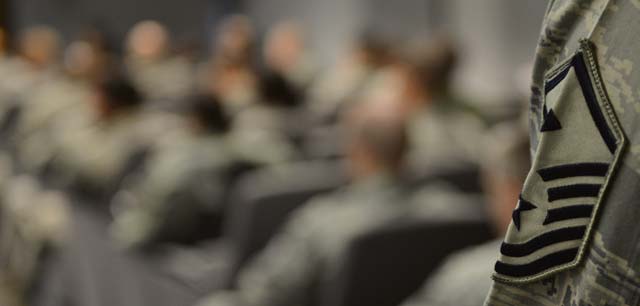
More than 120 military members from nine nations took part in the KMC First Sergeant Council’s annual First Sergeant Symposium Feb. 18 to 21 on Ramstein.
The symposium featured 10 international attendees for the first time in its history, including representatives from Belgium, Estonia, France and three from Germany.
During the symposium, Airmen interested in serving as first sergeants were given an in-depth look into what life is like in the special duty position.
The four-day event was filled with presentations about first sergeant responsibilities, including family care plans, administrative actions and counseling. The symposium also featured a current and former first sergeant panel, and international attendees were given a tour of the Kisling NCO Academy.
Chief Master Sgt. Janis Jallai, Air Surveillance Wing command chief master sergeant and senior enlisted leader of the Estonian air force, said he has wanted to attend the first sergeant symposium since 2011 when he first learned of the first sergeant position.
Jallai met with Chief MasterSgt. David Williamson, then U.S. Air Forces in Europe and Air Forces Africa command chief, and Chief Master Sgt. Adam McNair, USAFE-AFAFRICA Headquarters Squadron first sergeant.
During that meeting, Jallai said he was intrigued by the first sergeant role and wanted to incorporate the position into the Estonian air force.
He said he’s taking everything he learned during the symposium back to his leadership, but the briefing on first sergeant responsibilities was his favorite.
“It gave me a very good picture of what they do,” Jallai said. “What I liked most was hearing from former first sergeants and how they handled their responsibilities. In those moments I got some ideas on how to deal with my Airmen,
because they had some difficult situations and they developed solutions quickly.”
It’s very nice to know that the U.S. Air Force has the first sergeant position, Jallai added.
“You take care of your people, first sergeants are people focused. I’m very impressed with the passion U.S. Air Force first sergeants have,” he said.
Chief Master Sgt. Rolf Gemünden, a German air force NCO academy instructor and adviser, echoed Jallai’s sentiments.
Gemünden, a former first sergeant himself, said first sergeants in the German air force are similar to first sergeants in the U.S. Air Force; however, he said he was greatly impressed with the passion U.S. Air Force first sergeants display.
“The first sergeants in the U.S. Air Force have a great standard. They perform a great duty. The vision they have and what they want to do for their units and their Airmen is something I’ll definitely take back,” Gemünden said. “This passion first sergeants have in their duties — I want to pass that along to my NCOs.”
Gemünden also said it’s important for USAFE-AFAFRICA to continue building partnerships with events like the symposium.
“There is so much we can share and so much we can learn from each other,” Gemünden said. “Doing so may give you hints on how you can improve yourself or your service or help understand differences between one another.”
Building partnerships is a must, he added.
“The world is changing and many burning points are popping up and basically we share the same goals,” he said. “We want to get better, and we’re working together on the battlefield in these parts of the world, so why not improve our partnership as well.
“The more we learn from each other, the better we’ll function together,” he continued.
Master Sgt. John Carbon, 721st Aircraft Maintenance Squadron first sergeant and one of the symposium’s organizers, said he enjoyed putting the event together, the first in USAFE-AFAFRICA’s history to host international attendees.
“Any time you can say ‘first ever’ in the Air Force is a big deal,” he said. “I’m happy it’s the first, and I hope it’s not the last. I hope we can go to their countries and teach them more and have an even greater audience of their enlisted folks.
“I would love to be a part of the growth of another country’s enlisted corps. That would be historic in so many different ways,” he added.
Carbon has been a first sergeant for nearly a third of his 19-year career and said he loves the job, especially
when he can share what he does with others.
“We don’t turn the wrenches, we don’t build the houses, we don’t draw the blood, but we take care of the people who do,” he said. “As first sergeants, we take care of things behind the scenes. We’re kind of like roadies for a concert; we make sure the sound system works, so when the band gets out there and plays, nobody misses a beat.”


